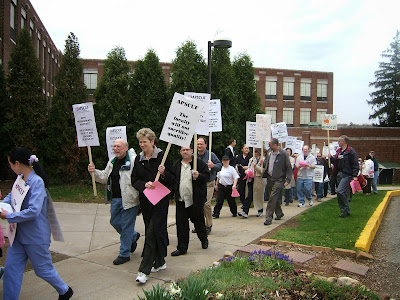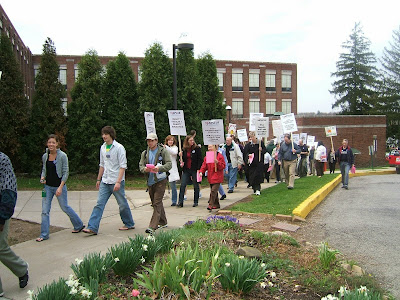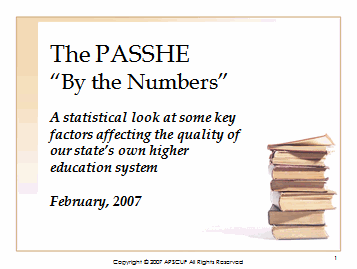Monday, April 30, 2007
Sunday, April 22, 2007
What Are You Prepared to Do?
Bill Ryan, Stacey Steele, Nikki Merchant, and Joe Harry will. Elise Grabner, Brad Wilson, Don Strano, and Lori Zulauf will. Patrick Burkhardt, Paul Mullins, Carol Holland, and Nora Ambrosio will. In other words, APSCUF members and APSCUF members alone bear the responsibility for securing us a fair contract. APSCUF members who are united, determined, resolute. APSCUF members who are willing to step off the path of least resistance, APSCUF members who are willing to make short-term sacrifices for long-term gains, APSCUF members who are willing to challenge the status quo, APSCUF members who are willing to take a risk in order to maintain the quality of the education that we offer, APSCUF members who are willing to support other APSCUF members, APSCUF members who are willing to be courageous, APSCUF members who are willing to behave like union members, who have each others’ backs, especially when faced with a daunting challenge.
How good a contract APSCUF is able to secure is directly related to what its members are prepared to do. To date, APSCUF has asked only minimal evidence of solidarity from its members: sharing off-campus e-mails and phone numbers, placing an APSCUF pride card in a visible place, posing for an APSCUF poster, wearing an APSCUF button, handing out Halloween eyeballs and holiday candy canes, signing up for picket duty. But the expectation for solidarity is about to take a significant leap forward with the scheduling of a strike authorization vote later this month. I will leave it to each APSCUF member to assess where they are on the solidarity scale, but persist with the question which I will address to the APSCUF members in the audience: What are you prepared to do?
You want a contract that redresses financial losses from the last contract? A contract that recognizes the valuable and ever increasing work that we contribute to the System? What are you prepared to do?
Over a five year period management salaries have increased by 13.7 % while faculty salaries have increased by only 3.3% But the State System has offered us a 0% increase in the first year? What are you prepared to do?
Over a five year span, inflation has increased by 7.4%. During that time national average salaries for faculty have increased 2.3% over inflation. But in the State System, faculty salaries have lost 2% compared to inflation. And the State system has offered us a 0% increase in the second year. What are you prepared to do?
Over a five year span, the number of managers in the State System has increased by 16.77%, the number of students by 15.6%, but the number of faculty by only 4.45%. Management workloads are not tied so tightly to student growth, yet they have kept pace with it. The overall net effect is that management workloads are leveling or diminishing, but faculty workloads grow yearly. But the state system has offered us a 0% increase in the third year. What are you prepared to do?
Because of the rise in both the number of students and the number of temporary faculty in the System, average advisement loads over the last eleven years have increased by 16,9%. But the State System has offered us a 0% increase in the fourth year. What are you prepared to do?
Frederick Douglass said: "If there is no struggle, there is no progress. Those who profess to favor freedom and yet deprecate agitation are men [and women] who want crops without plowing up the ground. They want rain without thunder and lightning. They want the ocean without the awful roar of its waters. Power concedes nothing without demand. It never did and it never will" (1857).
So I ask you one last time: What are you prepared to do?
Tuesday, April 17, 2007
Strike Authorization Vote
APRIL 24: 9:30 – 12:15 p.m. Vincent Lobby
12:25 – 1:30 p.m. University Club
1:40 – 3:30 p.m. Vincent Lobby
APRIL 25: 9:30 – 11:20 a.m. Vincent Lobby
11:30 a.m. – 1:20 p.m. University Club
1:30 – 3:30 p.m. APSCUF Office
APRIL 26: 9:30 – 11:30 a.m. APSCUF Office
11:40 a.m. – 1:30 p.m. University Club
1:40 – 3:30 p.m. APSCUF Office
*Absentee ballots available in APSCUF Office now.
Sunday, April 15, 2007
Did You Know?
Increased Number of Students & Management & Decreased Faculty in PASSHE
Did you know that since 1995, the number of students within the Pennsylvania State Systems of Higher Education (PASSHE) increased by 15.6% and the number of managers increased by 16.77%? In contrast, the number of faculty in the PASSHE only increased by 4.45%. Not only has the size of the faculty failed to keep pace with the number of students and administrators, but there is a much greater reliance upon temporary faculty, who have increased by 58.3% since 1995. The increased use of temporary faculty has required tenure-track faculty to advise more students. In 1995, tenure-track faculty advised an average 21.3 students, which increased to 24.9 by the Fall of 2006 which represents a 16.9% increase. (See chart below).

Loss of Tenure-Track Faculty in PASSHE
Did you know that the Pennsylvania State Systems of Higher Education (PASSHE) is losing quality faculty? Since 2002, 903 tenure track faculty members have departed the PASSHE. Over the same time period, only 555 new tenure track faculty have been hired. One-hundred and forty of the 555 newly-hired Tenure Track faculty members who left the PASSHE since 2002 simply resigned, and did not leave because of retirement, being denied tenure, or for being non-renewed. The net effect is a 25.23% loss ratio due to faculty resignations – a sure signal that economic reasons played a factor in their decision to leave (source: APSCUF Survey of Chapters).
Salary Increases for Management & Salary Decreases for PASSHE Faculty





